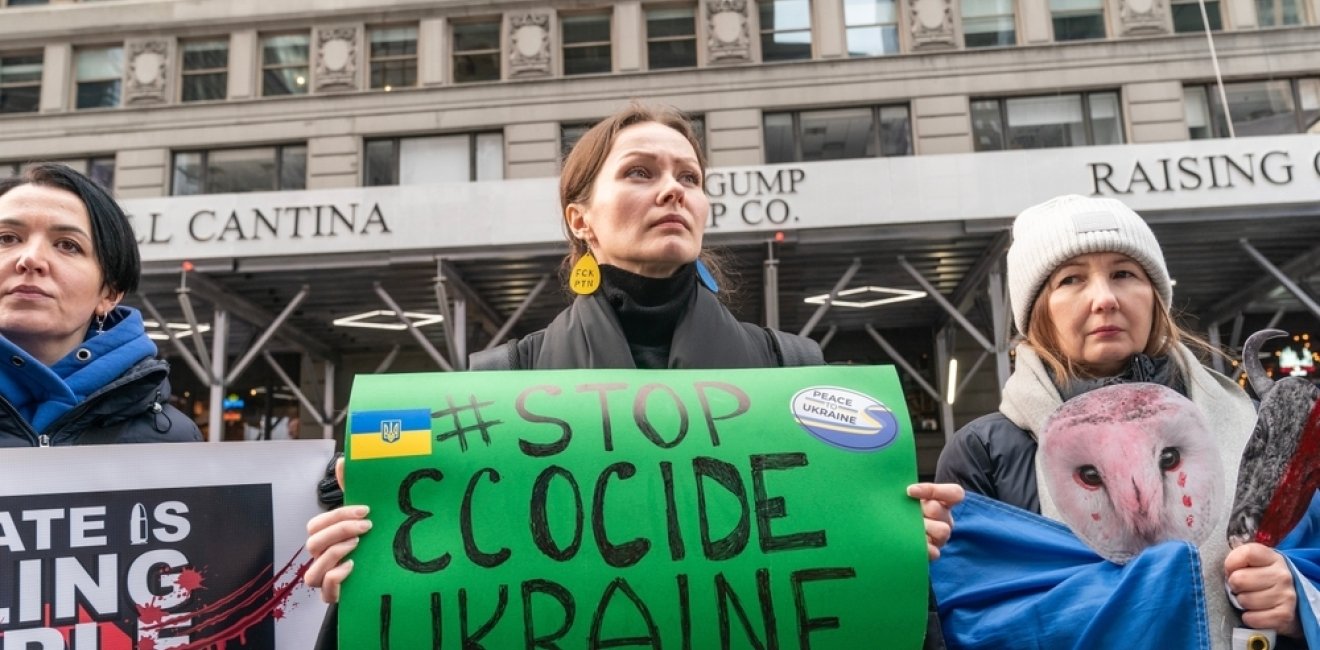
A blog of the Kennan Institute
Discussions of Russian reparations for its aggressive invasion of Ukraine have become louder, even though the war appears far from ending. The World Bank has just announced its new minimal estimate of $411 billion over the next ten years for Ukraine to recover and rebuild. Most such estimates focus on restoring a damaged economy and infrastructure, but that is far from the overall cost Ukraine has borne. One frequently omitted arena when costs are tallied is damage to the environment, more widely known as ecocide.
The idea of ecocide is relatively new. Its introduction to global discourse can be fairly attributed to a prominent Polish lawyer, Raphael Lemkin, who coined the term “genocide” and considered environmental harm a form of cultural genocide. This framing affirms that environmental harm by definition is a leading crime whose ruinous effects exceed even those inflicted on civilian populations or businesses during wartime.
Now that Russia has unleashed its catastrophic war against Ukraine, the tremendous harm to Ukraine and nature is becoming abundantly clear.
Examples of Harm
A few examples will illustrate the breadth and severity of the environmental harms Russia has inflicted on Ukraine, some with potential global spillover.
Despite almost sixteen months of active warfare, the “nuclear blackmail” option Russia has threatened to deploy remains for most of the world an unlikely, even absurd scenario. However, Russia watchers point out the reality of the threat in Russia’s persistent, systematic attacks on nuclear facilities located on Ukrainian territory. The seizure of the Zaporizhzhia Nuclear Power Plant, Europe’s largest such facility, by untrained Russian personnel and its increasing militarization has from the start raised concerns about potential incidents leading to chemical, biological, or radiation risks and contamination of water resources and a nuclear winter for Europe.
Though Russia already has the capability to “strike anywhere in Europe with nuclear weapons,” Putin’s recent declaration of intent to transfer tactical nuclear weapons to Belarus elevates the threat level and gives Moscow a favorable bargaining chip.
Another painful issue is mining of the land with explosives. Nearly 174,000 square kilometers of Ukrainian territory have been turned into a minefield, comparable in scale to the mining in Cambodia in the 1980s and 1990s.
In late February, Ukraine’s minister of environmental protection and natural resources Ruslan Strilets estimated damages during the first year of the war at 1.9 trillion hryvnias, including the loss of 2.4 million hectares of forest, with another 500,000 hectares in war zones. Hundreds of species of plants and animals under threat of worldwide extinction may be decimated in Ukraine through loss of habitat.
Even the UN, generally quite discreet in its comments on Russia’s aggression, has made its views known. Its recently released Environment Programme report provides a detailed account of the impact of the war on the environment, described by UNEP executive director Inger Andersen as “quite literally toxic.”
A Pragmatic Approach to Holding Russia Accountable
Holding Russia accountable, by which I mean a full recovery of the damages at the aggressor’s cost, faces multiple pragmatic challenges. A few key hurdles suggest the magnitude of the task of devising pragmatic solutions.
A fundamental issue is evidence collection, which is relevant both to the prosecution of crimes and to the tallying of damages. Here the lack of a centralized system for data collection and storage, along with the numerous different bodies involved in recording ecocrimes, may lead to loss of evidence.
The calculation of environmental damages is extremely complicated, especially when data must be collected in situations of active warfare. Operating in or near war zones requires technical solutions, such as mobile laboratories, along with well-trained forensic experts knowledgeable in ways of acquiring and securing data under least favorable conditions.
Any subsequent settlement would depend directly on the model of the special tribunal established to investigate Russia’s war crimes. There is not uniform agreement on the mechanisms that have been envisaged by the Rome Statute or by Ukrainian domestic legislation for this purpose. However, the remedy likely will have punitive and compensatory dimensions, which takes us to the third issue.
If both punitive and compensatory aspects of reimbursement are deemed to lie fully within the scope of a future special tribunal, that opens up several extremely difficult determinations, including compensation to civil population, restoration of damaged or destroyed infrastructure, redress of Ukrainian business losses, and compensation for environmental damage. The International Law Institute, the UN Compensation Commission, the International Court of Justice, and the International Center for Settlement of Investment Disputes (see “Decision on Counterclaims,” Burlington Resources Inc. v Ecuador) have each clearly stated that environmental harm is compensable through diverse legal procedures.
Of course, there are many collateral topics, but the above three issues require the most urgent attention.
While the resolution of the issue of accountability for atrocities lies mostly in the political realm, the remedy, including compensation for environmental damages, lies in the hands of a community of lawyers and courts. In the event Russia decides to freeze its war operations and relaunch them in the future, how it is to be held accountable for ecocrimes committed in Ukraine must be settled without delay.
The opinions expressed in this article are those solely of the author and do not reflect the views of the Kennan Institute.
Author


Kennan Institute
After more than 50 years as a vital part of the Wilson Center legacy, the Kennan Institute has become an independent think tank. You can find the current website for the Kennan Institute at kennaninstitute.org. Please look for future announcements about partnership activities between the Wilson Center and the Kennan Institute at Wilson Center Press Room. The Wilson Center is proud of its historic connection to the Kennan Institute and looks forward to supporting its activities as an independent center of knowledge. The Kennan Institute is committed to improving American understanding of Russia, Ukraine, Central Asia, the South Caucasus, and the surrounding region through research and exchange. Read more

Explore More in Focus Ukraine
Browse Focus Ukraine
Talking to the Dead to Heal the Living

Ukrainian Issue in Polish Elections


